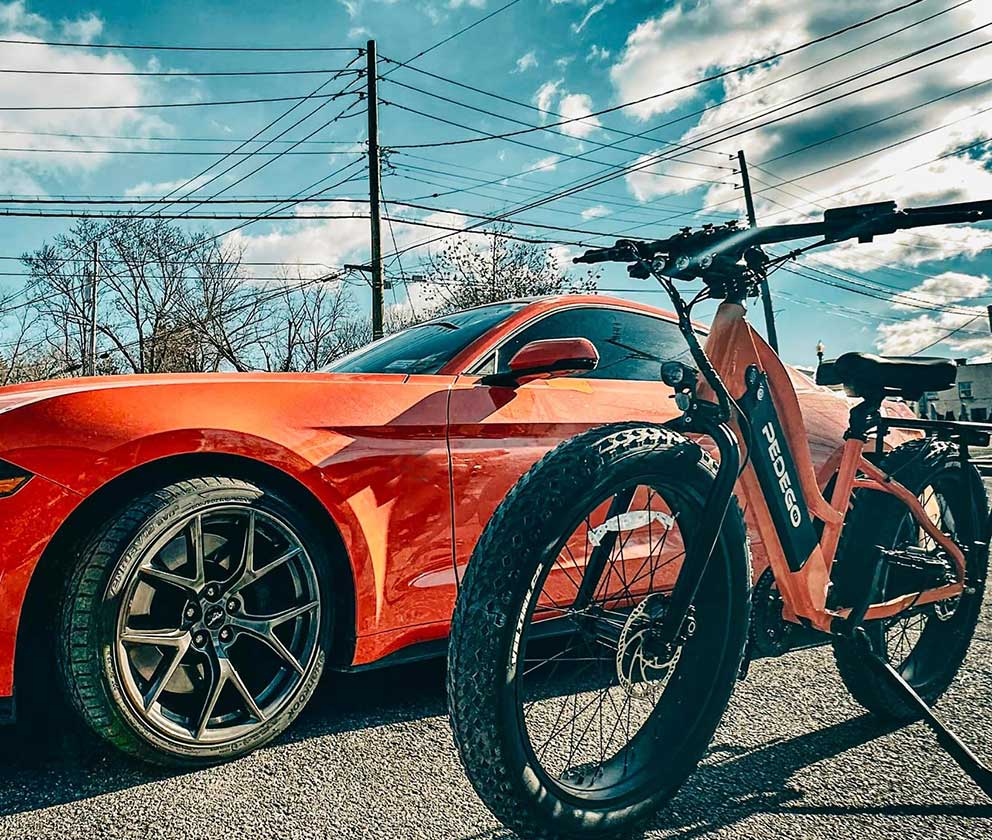Electric Transportation – Pedego eBike vs Electric Vehicle
April 21, 2023

When it comes to electric modes of transportation, size matters. The electric bike is compact, requires less infrastructure to support, and has a smaller battery (to charge and recycle). Parking and charging can take place almost anywhere! Contrast that to an electric automobile: Pedego eBike vs Electric Vehicle.
Let’s do it! Pedego Canada puts ebikes and electric cars side by side for a sustainability comparison.
In production
An electric car (EV) starts its life with a larger footprint than an ebike. An EV requires far more resources than e-bikes to manufacture. For perspective, it’s said that an average car battery takes 273 litres of gas to produce. An ebike battery is only one to two percent the size of that EV battery, taking merely 2.8 to 5.6 litres of gas to produce.
It’s true that any EV gets “cleaner” as it’s driven. Because it produces less carbon emissions while moving people from A to B, it achieves net zero faster than traditional transportation. Battery power for the win! We are on the right track.
But let’s further compare using battery size criteria. According to Canadian sustainable design expert Lloyd Alter, “a little Nissan Leaf [a car] carries enough electricity to fill 80 average e-bikes and a Ford Lightning [a truck] could fill 300 of them.” While “a more sophisticated analysis would take their range into account,” he adds, “it is obvious that an e-bike moves a human a lot further per watt/hour.”
An electric Hummer is one of the biggest EVs on the market. While the Ford Lightning weighs about 6,500 lbs, the Hummer weighs 9,000 lbs. Its battery weighs as much as a Honda Civic. The New York Times reports that it also uses about half as much lithium as a battery needed to power an electric bus.
The energy required to keep such a large electric vehicle on the road is substantial and responsible for significant greenhouse gas emissions. It’s not a green transportation solution. An EV isn’t automatically the green choice.
In use
We love an ebike for the minimal infrastructure required for charging and parking. Current electrical grids can accommodate the relatively low draw required to charge an ebike battery. A Pedego ebike takes between 2-6 hours to charge plugged into a regular outlet. In comparison, an electric car will take about 11 to 16 hours to charge using the same method. Options to install charging stations at your home exist.
On a municipal level, electric cars require a great deal of extra infrastructure. In late 2021, New York City promised a network of 40,000 curbside chargers by 2030 as part of its Electrifying New York plan. Imagine the evolution of fighting over parking in NYC! Electric cars still create traffic jams whether they’re on the road, at toll booths or waiting for a charging station.
The afterlife
In Canada, recycling of ebike batteries is leaps ahead of the effort to recycle car batteries. With 3.5 million cars expected on the roads by the end of this decade, advocates are calling for federally funded solutions to recycling of EV batteries. They say incentives for EV purchase need to be tied to vehicles with a recycling plan attached to them. Environmentally conscious consumers want this too – to know their battery isn’t ending up in the landfill.
It’s called “black mass.” It’s a mixture of lithium, cobalt and nickel – the critical minerals that need to be mined. Global demand has outstripped supply and Canada is busy trying to secure a domestic stock with plans of increased extraction. It’s said that batteries are the sticking point to electric vehicle sustainability, and we see why.
Recycling old batteries reduces the need for mining because we can recover 95 per cent of needed minerals from lithium-ion batteries. And, there is no limit to the number of times the black mass can be reclaimed from an expired battery.
Environmental sustainability is as important to us as it is to you! The Call2Recycling program was introduced in Canada on January 1, 2021 and Pedego Canada was an early adopter.
Since its start, Call2Recycle Canada has collected over 16 million kgs of batteries. In 2022, almost 4.4 million kgs of batteries were diverted from landfills and safely recycled.
Call2Recycling accepts batteries up to 5 kg. British Columbia also recycles an entire bike as of March 2022. Learn more about Pedego Canada’s Call2Recylce connection…
Feeling inspired to buy an efficient electric vehicle? Find a Pedego dealer near you!


